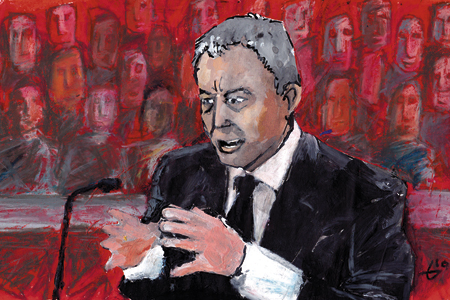
New Venue, Same Script
Issue 66 March 2010
Tony Blair’s appearance at the Iraq inquiry gave no new answers to very old questions.
When Tony Blair appeared before the Chilcot inquiry last month, his testimony was eagerly anticipated and watched: channels in the UK and the US carried his appearance live and newspaper websites ran minute-by-minute updates. Many pointed out his hands were shaking at the start and he looked visibly nervous. Yet those nerves quickly faded and in six hours of testimony we learned almost nothing new. Why?
The first reason is the panel: other journalists have pointed out there are few on the panel with the skill to question senior politicians. This is a basic point: any barrister with a bit of experience would be able to pick through the charades and linguistic masks of witnesses. It is a huge failing on the part of the Inquiry that this basic ability is lacking.
The second reason is that the narrative that framed the questions was lacking. The real questions remain the same today as they were in 2003: Why Saddam? Why now? For what reason? International law does not allow states with powerful militaries to go around removing governments they deem could, perhaps, in some circumstances, at some future time, become threats. Even if Saddam was a threat, was he the most pressing, the most dangerous threat at the time? Was his WMD programme the most advanced? The most likely to be used? Was his regime the most likely to pass weapons and know-how on to others, on to non-state actors?
And more than any of these questions there is the most basic question, the question that some want to see posed to Britain’s prime minister in the dock: what was the casus belli? Under international law, only three reasons can justify a war: self-defence, humanitarian intervention or UN authorisation. The Iraq war had none of these.
Blair told the inquiry that Saddam was a threat: no doubt he was, but there are many threats in the world, and the question is why Blair chose to confront this particular one, at that particular time, with other people’s lives and other people’s money. There are other serious questions to be asked, such as whether the military were given enough time and resources to prepare, and what preparations were taken for the aftermath of the war, as mandated by the Geneva Convention. But answers to the central questions affect all the others.
Blair’s view of the situation was that he, as Prime Minister, was the person who made the decision and that he has to live with the consequences of that decision. “There is not a single day that passes that I don’t think about it,” he told the inquiry. And while he might have been genuinely convinced of the risk from Saddam Hussein’s non-existent weapons, the fact is the proof was lacking. Belief is not enough – that’s not what is meant by conviction politics, where policy is conducted by those with the strongest beliefs, the strongest confidence in their guesses.
Regardless of what Blair believed, the Iraq war should have turned on facts – and Blair’s colleagues did little to hunt them down. The point of a parliamentary system is that the person at the apex, the Prime Minister, is held in check by others around him. The Cabinet and other members of parliament failed to hold Blair properly to account.
There doesn’t seem to have been enough forensic dissection of the grounds for war, especially considering what was being considered: even without the complications that followed the invasion, it was always clear an invasion would cost a significant number of lives, hefty sums of money and enormous political resources. Politicians ought to have considered more carefully any move to war.
Ultimately, however, the chief problem with the Chilcot Inquiry is that it is an inquiry and not a court of law, a casual conversation rather than a cross-examination. The Iraq war will haunt Britain for years and its effects will be felt for a generation. An event of that magnitude needs commensurately serious consideration – with the possibility of applying serious legal sanctions. λ
Faisal al Yafai is an award-winning journalist and a Churchill Fellow.
Bookmark this |
|
Add to DIGG |
|
Add to del.icio.us |
|
Stumble this |
|
Share on Facebook |
|
Share this |
|
Send to a Friend |
|
Link to this |
|
Printer Friendly |
|
Print in plain text |
|


Comments
0 Comments